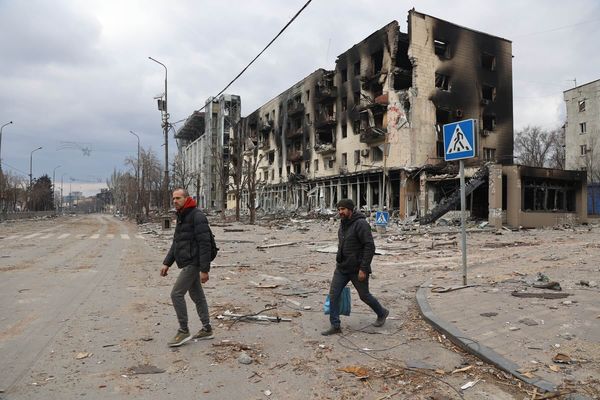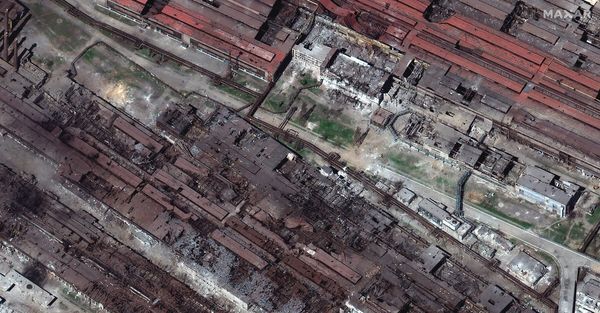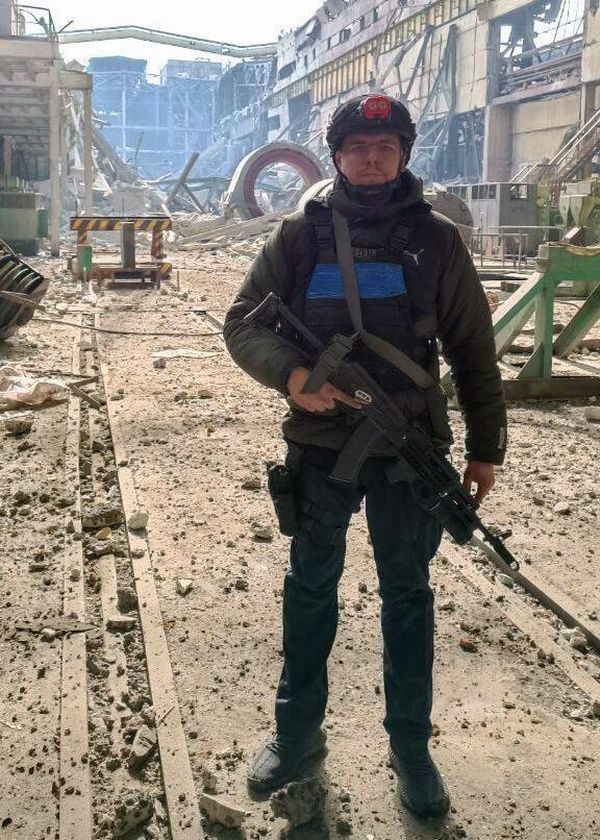Defense of Mariupol, Azovstal, Capture and Liberation — The Story of Policeman Boris Kolesnikov

Policeman Boris Kolesnikov from the first days of the Great War defended Mariupol. With experience of service in the Azov regiment, he participated in operations to detect and destroy enemy DRG. After the defense of Azovstal, the man fell into Russian captivity: first Boris was sent to Olenivka, and later to a detention center in the Voronezh region of the Russian Federation. In total, Boris stayed in Russian detention for 265 days.
Boris was exchanged on February 4, 2023. Over time, the man returned to the police service. Here is his difficult first-person narrative for the publication “Prohibition”.

Mariupol: police service and the fight against DRG
On February 24, 2022, the law enforcement agencies of the Donetsk region came into service: personnel were raised on alert, orders were received to stay and work in the city. It was very important for the inhabitants of Mariupol to see that the law enforcement agencies were performing their duties, so many law enforcement officers remained in Mariupol, including the leadership and special units of “CORD”. Our main task was to ensure order so that there was no looting, because people began to feel impunity. Unfortunately, in the early days and weeks of the Great War, there were cases of store robberies, in particular those carrying alcoholic beverages. Therefore, in supermarket chains, police broke bottles of alcohol so that locals did not consume it. I can say with confidence that none of the law enforcement agencies and the Armed Forces of Ukraine drank alcohol — it was strictly prohibited.

At the front, side by side with the military, special police officers beat the Rashists
Mostly patrols guarded infrastructure facilities and helped the military find Russian DRG; we constantly exchanged information over the radio. From the equipment we had helmets and body armor, in weapons - small arms, machine guns and a hand-held anti-tank grenade launcher.
In March, my partner and I were in position. We were the eyes — we were watching the enemy and passing information to the military units. Then my colleagues in another position noticed a Russian tank with the symbol “Z” and reported it to their own. The enemy saw this group and fired directly at the house, one of the policemen was wounded.
When mobile communication in the city practically disappeared, it was still possible to catch the network near Kyivstar and Vodafone stores. Once a lot of civilians and military gathered near one of them: everyone called their relatives. And then the Russians hit this building from the “Grad”. My partner and I were saved by the fact that we were in armor and in a collector car that was badly cut. Those who survived fled in terror on their own. We were able to quickly pick up the badly wounded by shrapnel and take them to the hospital, which was still working until the enemy took another stab. The military of the Russian Federation has a technique with which they monitor the accumulation of mobile devices in the city. So this is not the only case when the enemy has hit a crowd of people in Mariupol with artillery or “Grad”.
After the encirclement and actual occupation of the city, some of the policemen decided to stay until the end. Some families tried to leave through Russian checkpoints under the guise of civilians. Some succeeded, some did not. Among the law enforcement officers of Mariupol were traitors who took the side of the Russian Federation. I don't even want to mention it, it's a human factor... However, it's still a shame to understand that there are such people. How can you do this if you have a passport of a citizen of Ukraine? How can you sell your country, mother?!

Bombing the city on Azov: survival in the environment
My house in Mariupol was not left — there was a direct intrusion into the apartment. Mother somehow came there to pick up the surviving things. Our neighbor came up and stopped her: “You what, get out of here.” The Russians knew that in 2014-2016 I served in the Azov regiment. They interviewed all the neighbors, looked for me when I was already at Azovstal along with the military.
Most of all, I was shocked by the brutality of the Russians. Realizing that civilians remained in the city, the enemy really leveled everything with the ground. At first, the enemy went forehead to forehead, infantry to infantry, but Azov and other units were very well prepared. The Russians realized that this is not the way to take the city. Then the massive shelling began: they just destroyed everything. In the Sea of Azov, some 15 km from the coast, the enemy pulled ships to shell the city. We saw them, but we had no weapons to destroy them. Even in Mariupol, aviation worked daily: fighters flew from Yeisk or from the side of the sea. They destroyed the city with some special malice.
The Russians were beaten to the teeth by the Ukrainian military and understood that they would not take the city. When the enemy entered the positions of the defenders, bombs, artillery, shells first fell there, and then the infantry approached. Where it is impossible to raise the head, our military and police raised it and fought back. They kept, as far as possible, the defense, even in the minority.
There were a lot of people in the theater. We looked there: is everything good, who needs what. Who has small children, asked for diapers and baby food. And so cynically, the enemy dropped an air bomb on the roof of this building with the inscription “Children”. The Russians knew what they were doing. The drama theater is one of the many bombed places where civilians and children were. The maternity hospital, the drama theater are the examples of crimes of the Russian Federation that the world has seen. What has the world not seen yet?

Crimes of the Russian Federation: the murder of civilians in Mariupol
How many civilians actually died in Mariupol is unknown, and we will not know for sure as long as the city is controlled by Russia. The occupiers are cynical, because this blood on their hands, they call the figure of 115 thousand civilians. I think it may correspond to reality. Every day we saw new and new chaotic burials appear. People asked us: “The deceased lies right in the yard, what to do?” We advised putting plates with names and dates. I sincerely believe that Mariupol will be returned, and it is necessary to identify every deceased citizen. People themselves buried their dead relatives and neighbors near houses, in courtyards and along sidewalks... Although the Russians must have already dug these burials to hide the scale of the tragedy.

Holding positions on “Azovstal”
Since April 15, I and other defenders broke out of the encirclement of the Russians in the Primorsky district to the “Azovstal”, where the positions of our fighters were already located. At night, while the military rested, there was a rotation among the law enforcement officers. I and other police colleagues guarded the Dzherelo bunker, because it is a large area with many loopholes for the enemy. So we protected our military friends. Subsequently, they took up positions in the factory — already as military, because there were many wounded, and there were not enough people for defense.
We tried to defend ourselves so that the enemy would not push us to the sea. Hold on as much as possible. Everyone had to be a universal soldier. No one was responsible for you. As the military used to say, “Provoked — killed!”
Doctors and guys from combat units arrived in the occupied city on helicopters — these are heroes. They knew that the city was occupied and still flew in and helped with medicine and weapons, and evacuated the badly wounded defenders while they could. But still there was a critical shortage: the shelling did not subside, the injuries were very severe. Despite the fact that the doctors did everything possible and impossible, the brothers were rotting alive. Without the necessary equipment and medicines, we understood that these people would die. The hospital was in the bunker “Zhelizyak”, which was practically destroyed by the last arrivals. Imagine: the wounded with droppers in their hands ran through the plant in search of shelter. No one deserves such a death.
Therefore, in order to save the lives of our people, we went into honorable captivity. Moreover, there were agreements that the Russian side has not yet fulfilled.
The defenders of Mariupol were required to win time and destroy the Russians as much as possible everywhere: in the air, on the ground, on the water, on land. And everyone did well with that.
The merit of Mariupol is that it was able to win a little time and allow the state to receive help and weapons from the West and stop the offensive on Zaporizhia, and subsequently — to liberate the Kharkiv region. Even after the complete occupation, the tanks were not withdrawn from there. That is, our military in Zaporizhia had more time to prepare and dig in, because the Russians would have gone further.
Boris Kolesnikov: captivity in Olenovka
All the defenders who came out of “Azovstal” into captivity were brought to a small colony in Olenovka, where there were five barracks designed for about 200 people. They slept mainly on a concrete floor. You lie down and think, “What's next?”
There was no food, the colony was unable to feed so many people. Before us, part of the 36th Marine Brigade from the Ilyich plant was already there. Over time, prisoners began to be distributed in Russian prisons. We were protected by the Federal Service for Execution of Punishments of Russia. Soldiers from the regiment “Azov” were kept apart.

The Russians questioned who killed whom and in what positions the defenders of the city were. I say, “No one killed anyone, the boys fought. They are professional military, not killers or mercenaries. They do not aim to kill civilians.” They wanted to force us to give fake testimonies to then start fake criminal cases. Over time, you get used to this attitude. Every day of captivity is bullying, and you are waiting for an exchange every day. You are constantly told that you are a Nazi and a fascist.
In captivity, everyone was an inventor. Someone, until they forbade, took bread with him from the dining room: they laid out a circle from it and fantasized that it was pizza. We were constantly undernourished. All lunch — water and cabbage, they called it “soup”. We gave a ladle of porridge from putas. In order for the body to get at least something useful, we brewed a decoction on sprigs of cherries. It was bitter and not at all tasty, but the body felt something new.
Every day in captivity was the same. You wake up, run at six in the morning for a check-up, sit on corks, sing the anthem of Russia, wait for lunch, and after lunch you wait for dinner. After dinner, you fall asleep hungry and think about when breakfast will be. To keep in touch with the outside world, we exchanged notes between the barracks. Someone was able to bring the radio to the colony — so we learned in fragments about the news at home, in Ukraine. They also understood that we had a mobile connection because people were calling. They searched for phones but found nothing.
Voronezh Prison: in what conditions Ukrainian prisoners were held
I stayed in Olenovka for 4.5 months. Then I was transferred to a detention center in the Voronezh region. It is a very long and difficult path. Any soldier who has been captured will say that the hardest thing is going to prison. Ours with the national guard Ivan Mikula was located just above the interrogation room. It was very difficult to listen to the sounds that came from there. I can assure you that the Russians did not follow the rules for the treatment of prisoners of war according to the Geneva Conventions. In prison we did not have the status of prisoners, we were nobody there. I have not seen the Red Cross or the United Nations. Ukrainian prisoners were not provided with any medical assistance: there was a guy with a serious wound that simply rotted. Before captivity, I weighed 90 kilograms, and came out of there with a weight of 65 kilograms with a height of 1.82 meters.
In the camera you can't even see the sky. The windows are painted, only dim pink light passes through them. From the camera you leave with your eyes closed in the swallow pose if you are taken somewhere. At interrogations, everyone was offered to switch to the Russian side. For this they promised an apartment in Kherson — for a second, to the already liberated city. They even promised to release if you sign a waiver of Ukrainian citizenship.
Release from captivity and service in the patrol police
Only faith and jokes with my friend Ivan Mikula saved me. Every day we believed that everything could not end so that we were about to be exchanged.
My exchange took place on February 4, 2023, it was all very fast. I still probably do not realize that I am already at home, free. It was nice when, during the exchange, we were met by the leadership from the National Police. My mother called me, I said: “Mom, everything, it's over, I'm in Ukraine!” Very grateful to our doctors, the National Police and the Ministry of Internal Affairs for all their help.
I do not imagine myself without a uniform and I want to continue to serve, so after rehabilitation two months later I returned to my duties — now in the patrol police of Lviv region. At the same time, I am studying military.
The captivity left a very heavy mark on life. In the first days in Kiev, I was just glad that I could breathe the free Ukrainian air. My mind refused to believe that it was possible to go to the supermarket and buy something. At first I was even afraid to do it, because in captivity you are punished for every wrong action. The consequences of captivity are still there, and it is impossible to live fully after what happened to you, because from there you are already another person. And thank God, if you remain adequate and your psyche can withstand all this. It's good that we supported each other, it helped to hold on.
Recently, my friend, Marine Peter, with whom we were in Olenovka, was released. I went to Kiev for treatment and, of course, went to him in the ward to hug, congratulate on his native land, pass sweets.
But exchanges are a problem. We all want everyone to get out of there as soon as possible. We left Azovstal under certain conditions, which the Russian side has not yet fulfilled. It was agreed that we would be exchanged for 2-3 months, but I was in captivity for 9 months, and the other guys are still there. I really want the world not to forget about them: to speak everywhere, to condemn the actions of the aggressor country, to try to stop it.
The war has not yet been won. I think everyone has to participate in our victory. In difficult times for the country, you need to help and be useful. We don't know what will happen tomorrow.
National Police of Ukraine






